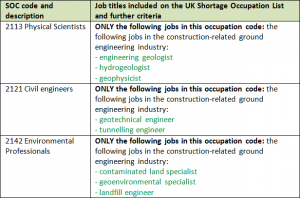Although there are indications that the supply of UK and EU graduate engineers is increasing, there are still sufficient hard to fill vacancies to indicate a continuing shortage of ground engineers. Although immigration currently has a high press and political profile, it is worth noting that where the Home Office acknowledges that a skill shortage exists, certain work permits can still be fast tracked – despite the tightening of visa rules for migrants from outside Europe.
Recruitment from outside Europe requires the employer to hold a sponsorship licence (see www.gov.uk/government/collections/sponsorship-information-for-employers-and-educators.) Once this has been obtained, the visa application procedure requires the employer to fulfil the requirements of Resident Labour Market Test (RLMT) – i.e. to demonstrate that it is not possible to fill the post from within the UK or EU. This can be time consuming and risks the possibility that the desired applicant finds alternative employment elsewhere before the work permit is received.
The good news, however, is that Ground Engineers are on the Shortage Occupation List (SOL). This does not affect the requirement for employers of migrant labour to be licensed, but once this hurdle has been overcome (and the necessary administrative and monitoring structures have been put in place) – the RLMT is not necessary and the issue of a visa should be relatively straightforward and reasonably quick.
A number of things to be aware of:
- Your HR Department may not be aware that Ground Engineers are on the SOL. (Civil Engineers were removed from the list some years ago). See Table 1.
- The visa issuing people do not understand ground engineering. To minimise problems, avoid the temptation to use your company’s job title. Stick to the generic occupations listed in the SOL. These are (April 2014)
- A minimum salary applies: for new entrants this is £19,700 (SOC code 2142); £20,000 (SOC code 2113); and £20,200 (SOC code 2121). For experienced people it is £24,600 (Soc Code 2142); £27,000 (SOC Code 2113); and £28,700 (SOC code 2121). (Higher thresholds may apply if the holder is accompanied by his/her family).
- The fees for applications via the SOL route are slightly lower than normal Tier 2 application rates.
- Since 2011 there has been a limit of 20,700 work permits issued each year under the Tier2 regulations. Applications for job titles on the SOL have priority.
- For very experienced, very specialist roles who don’t easily fit into the above job titles – it may be possible to get a work permit under the Tier 1 Exceptional Talent rules. These require a letter of personal recommendation from someone in the UK who is familiar with the applicant’s work and his/her contribution to the field, and qualified to assess his/her claim to be a world leader or a potential world leader in the field. Applications will be assessed by the Royal Academy/Royal Academy of Engineers/The Royal Society.
Further information and forms can be found online – and contact numbers are readily available for guidance by UK Visas and Immigration staff.
The Ground Forum would be very interested in receiving feedback (positive and negative) from anyone obtaining visas for ground engineers – and advice that might be helpful to other applicants.
REMEMBER: Recruitment from outside the UK is not a substitute for developing UK talent. The industry urgently needs more well qualified UK ground engineers. Many employers are already reaping the rewards of closer liaison with universities and the early recruitment of undergraduate students and recent graduates who can benefit from work experience and specialist training in the ground engineering industry.
